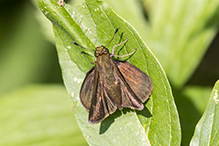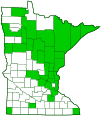Dun Skipper
(Euphyes vestris)
Conservation • Description • Habitat • Ecology • Distribution • Taxonomy
|
|
|||||||||||||
Description |
Dun Skipper is a small, dark, nondescript grass skipper. It has a wingspan of 1⅛″ to 1⅜″. The male is dark blackish-brown all over. There is a black stigma on the forewing that appears as a dark diagonal band but no other markings. The female has small two pale spots on the upper side of the forewing that are even smaller on the underside. The underside of the hindwing may also have a faint spot band. The antennae are short and faintly striped. Each antenna has a black swelling (club) at the tip, and a pale, thin, hooked extension (apiculus) at the end of the club. The caterpillar is pale green, slender, and up to 1″ long. The head is burnt cienna with a central black spot, a horseshoe-shaped white mark partially surrounding the black spot, and a pair of white lines running from the back of the head to the eyes. The thorax and abdomen are pale green with a slightly darker middorsal line and sometimes darker middorsal and subdorsal pinstrip lines. The breathing pore (spiracle) on the eighth abdominal segment is conspicuously enlarged. On the rear (posterior) half of abdominal segments 1 through 8 there are seven shallow ring-like creases (annulations). The preceding description could easily be made for all other Euphyes caterpillars. Identification is best made by rearing them into adults. Mature caterpillars are seen from late summer to late fall and early spring. |
Size |
Wingspan: 1⅛″ to 1⅜″ |
Similar Species |
Northern broken-dash, Dun Skipper, and Little Glassywing are called “the three witches” because their dark wings make it difficult to tell “which one is which.” |
Habitat |
Moist areas near deciduous woods |
Ecology |
Season |
One generation: Late June to late August. |
Behavior |
|
Life Cycle |
|
Larva Hosts |
Sedges and possibly some grasses |
Adult Food |
Nectar of white, pink, and purple flowers |
Distribution |
||
|
Sources 7, 21, 27, 29, 30, 71, 75, 82, 83. Biodiversity occurrence data published by: Minnesota Biodiversity Atlas (accessed through the Minnesota Biodiversity Atlas Portal, bellatlas.umn.edu, 7/1/2025). |
|
| 7/11/2025 | ||
Occurrence |
||
|
||
Taxonomy |
|
Order |
|
Superfamily |
Papilionoidea (Butterflies) |
Family |
Hesperiidae (Skippers) |
Subfamily |
Hesperiinae (Grass Skippers) |
Tribe |
Hesperiini |
Subtribe |
Hesperiina (Branded Grass Skippers) |
Skippers have traditionally been placed in their own superfamily Hesperioidea because of their morphological similarity. Recent phylogenetic analysis (Kawahara and Breinholt [2014]) suggests that they share the same common ancestor as other butterfly families, and thus belong in the superfamily, Papilionoidea. |
|
Subordinate Taxa |
|
Eastern Dun Skipper (Euphyes vestris metacomet) Harbison’s Dun Skipper (Euphyes vestris harbisoni) Osceola Dun Skipper (Euphyes vestris osceola) Prairie Dun Skipper (Euphyes vestris kiowah) Western Dun Skipper (Euphyes vestris vestris) |
|
Synonyms |
|
Euphyes vestris kiowah Euphyes vestris metacomet Hesperia kiowah Hesperia metacomet Hesperia osyka Hesperia vestris Pamphila californica Pamphila immaculatus Pamphila osceola Pamphila rurea |
|
Common Names |
|
Dun Skipper |
|
Glossary
Apiculus
A thin hooked or pointed extension at the ends of each antennae just beyond the club of all skippers except skipperlings (subfamily Heteropterinae).
Spiracle
A small opening on the surface of an insect or arachnid through which it breathes.
Stigma
In plants, the portion of the female part of the flower that is receptive to pollen. In Lepidoptera, an area of specialized scent scales on the forewing of some skippers, hairstreaks, and moths. In other insects, a thickened, dark, or opaque cell on the leading edge of the wing.
Visitor Photos |
||
Share your photo of this insect. |
||
This button not working for you? |
||
|
||
|
||
MinnesotaSeasons.com Photos |
||

Slideshows |
|

Visitor Videos |
||
Share your video of this insect. |
||
This button not working for you? |
||
|
Other Videos |
||
Prairie Life: Dun Skipper |
About
Published on Aug 2, 2015 This short film introduces the Dun Skipper (Euphyes vestris), a common, small brown Hesperiid butterfly. Filmed at the Rydell NWR, Erskine, Minnesota (29 July 2015). |
Finding Dun Skipper Pupal Nests |
About
Published on Jun 6, 2010 Just as sedge-feeding skippers of the genus Euphyes construct unique nests; they also pupate in these nests and seal off the entrance with a silken plug as demonstrated with the dun skipper (Euphyes vestris metacomet) in this video. |

Visitor Sightings |
||
Report a sighting of this insect. |
||
This button not working for you? |
||
|
|
MinnesotaSeasons.com Sightings |
||

Created: 8/9/2017 Last Updated: © MinnesotaSeasons.com. All rights reserved. |

